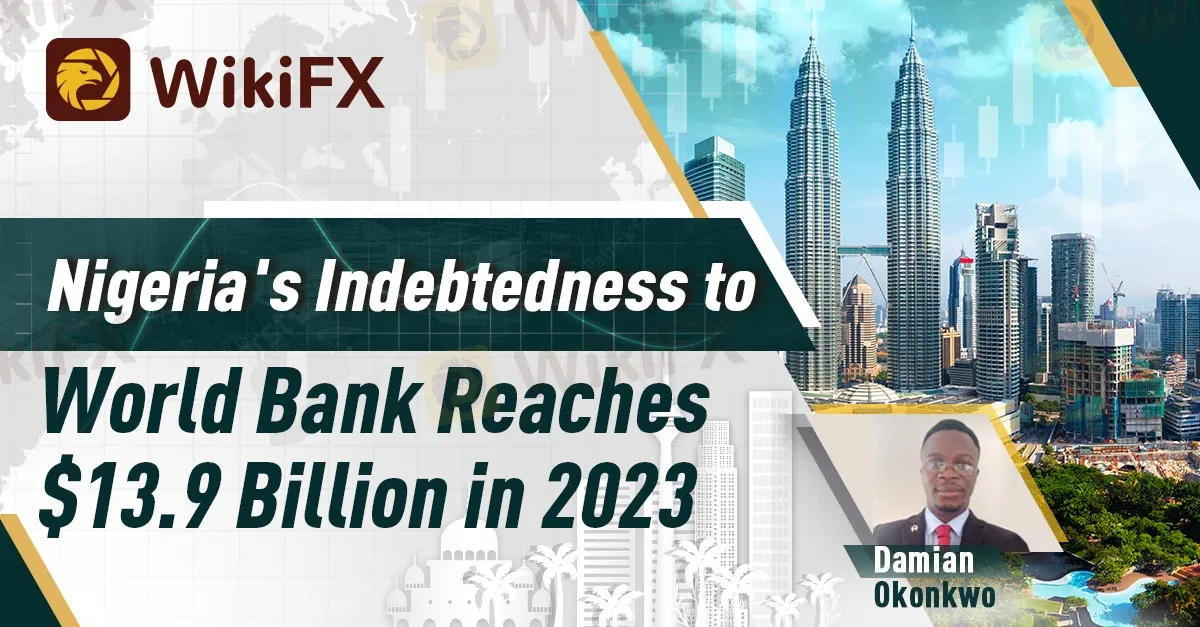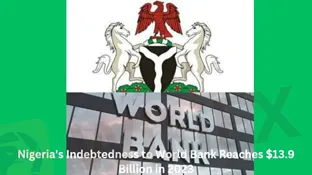简体中文
繁體中文
English
Pусский
日本語
ภาษาไทย
Tiếng Việt
Bahasa Indonesia
Español
हिन्दी
Filippiiniläinen
Français
Deutsch
Português
Türkçe
한국어
العربية
Nigeria's Indebtedness to World Bank Reaches $13.9 Billion in 2023
Abstract:Nigeria's indebtedness to the world bank has attained a high record at the beginning of 2023, with the total debts sitting at $13.9 billion as of December 2022.

By: Damian Okonkwo

Nigeria's indebtedness to the World Bank has continued to increase, reaching a new high record in 2023. According to recent data from the National Bureau of Statistics and the Debt Management Office, Nigeria's indebtedness to the World Bank has risen to $13.9 billion as of December 2022. This marks a $1.5 billion increase from the previous year and a total increase of $3.8 billion since 2019.
Nigeria's increasing reliance on external debt, particularly from the World Bank, has been driven by economic challenges resulting from the Covid-19 pandemic and subsequent lockdowns. With the fall in oil prices, Nigeria's economy contracted by over 4% in 2020, resulting in a sharp decline in government revenues and increased poverty rates.
In response to the pandemic's economic impact, the World Bank approved Nigeria's request for a $1.5 billion loan in December 2020. The loan was intended for two projects: the Nigeria Covid-19 Action Recovery and Economic Stimulus Program for Results (Nigeria CARES) and the State Fiscal Transparency, Accountability, and Sustainability Program for Results (SFTAS).
While the loans from the World Bank and other lenders have helped to stabilize Nigeria's external reserve position and exchange rate, concerns about the country's debt burden persist. Nigeria's public debt stock, which includes external and domestic debt but excludes Ways and Means, stood at N46.25 trillion ($103.1 billion) as of December 31st, 2022. Including the N22.8 trillion ($50.8 billion) in Ways and Means, the total public debt stock rises to N69 trillion ($153.9 billion).
Similarly, while external borrowing can provide a quick source of funding for development projects, it can also lead to debt distress if not managed effectively.
This underscores the need for the government to adopt a more sustainable approach to its debt management and explore other financing options aside from borrowing.
The rise in Nigeria's external debt over the past few years underscores the need for the country to diversify its revenue sources and explore alternative financing options. The government must take proactive steps to address the issue of debt sustainability, such as improving tax collection, reducing non-essential spending, and promoting private sector investment.
More importantly, the government needs to ensure it remains transparent and accountable in its borrowing and debt management practices to maintain investor confidence and forestall any potential debt crises from emanating.
Ultimately, Nigeria must strike a balance between financing development projects and ensuring long-term debt sustainability to secure a prosperous future for the country.

Disclaimer:
The views in this article only represent the author's personal views, and do not constitute investment advice on this platform. This platform does not guarantee the accuracy, completeness and timeliness of the information in the article, and will not be liable for any loss caused by the use of or reliance on the information in the article.
Read more

ATFX Enhances Trading Platform with BlackArrow Integration
ATFX integrates the BlackArrow trading platform, offering advanced tools for forex, crypto, and stocks with automation and real-time analytics for traders.

Exposing the Truth: What Happened with the Losses of Thousands of Dollars on the GlobTFX Platform?
The facts are clear and undeniably shocking—GlobTFX has caused significant financial losses to well-known traders in the Arab world. Eighteen victims have confirmed a total loss exceeding $22,372! But this is just the tip of the iceberg…

UK Hits HSBC, 3 Banks with £104.4M Fine for Bond Misconduct
HSBC, Citi, RBC, and Morgan Stanley fined £104.4M by CMA for sharing sensitive bond market info, distorting UK gilts competition from 2009-2013.

XTB Secures Chilean License, Expands Latin America Footprint
XTB gains a securities agent license in Chile, boosting its Latin America presence. The broker plans to offer stocks, ETFs, and derivatives to local investors.
WikiFX Broker
Latest News
Germany's Election: Immigration, Economy & Political Tensions Take Centre Stage
WikiFX Review: Is IVY Markets Reliable?
ATFX Enhances Trading Platform with BlackArrow Integration
Brazilian Man Charged in $290 Million Crypto Ponzi Scheme Affecting 126,000 Investors
IG 2025 Most Comprehensive Review
SEC Drops Coinbase Lawsuit, Signals Crypto Policy Shift
Construction Datuk Director Loses RM26.6 Mil to UVKXE Crypto Scam
Should You Choose Rock-West or Avoid it?
Franklin Templeton Submitted S-1 Filing for Spot Solana ETF to the SEC on February 21
Scam Couple behind NECCORPO Arrested by Thai Authorities
Currency Calculator






